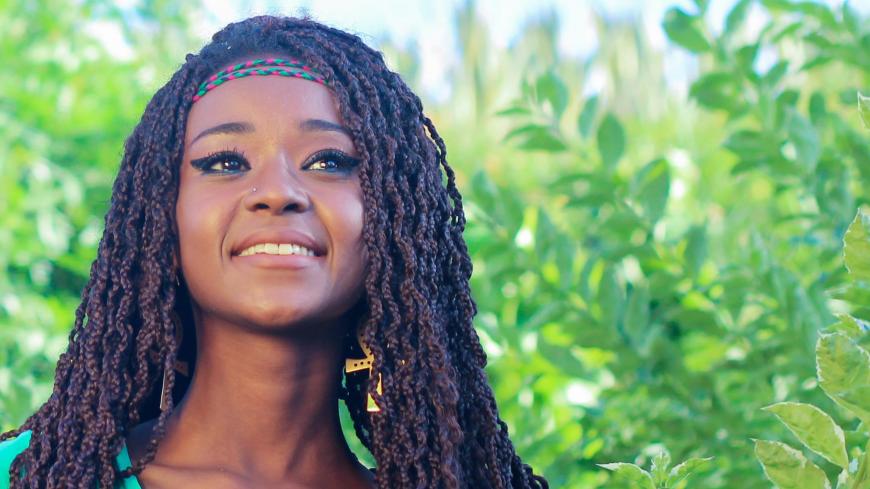A Sudanese-Egyptian woman’s daily struggles against racism in Egypt, shared online since 2013, are now set to become a book that will explain the difficulties of being a black woman in the Arab world’s most populous country.
Fatima Ali, a former Sudanese beauty queen who now works as a fashion model, told Al-Monitor that her website, which was last updated in 2013, aimed to shed light on the daily suffering that dark-skinned Egyptian and non-Egyptian women face on the streets of the country, from name-calling to harassment.
Ali, 29, was born in Sudan but came to Egypt when she was nine months old. “At some point in my life in Egypt, I grew fed up with the daily negative comments that I hear from people on the streets about my color,” Ali told Al-Monitor on Dec. 9. “That is why I decided to set up a site where I can vent my anger on prejudice and discrimination against black people in the country.”
Four years after Ali started putting her experiences online, she is hoping to republish most of the content in a book called “Diary of a Black Girl.” “The book has been a plan of mine, and I hope it gets out and impacts more people,” she added.
“My name is Fatima, a Nubian Sudanese girl whose skin is dark. I decided to write my diary as a black girl who sometimes suffers from the ignorance of society and sometimes praised by [the same society] for her different look and her distinctive dark color,” she wrote in one of her introductory posts.
In that post, Ali narrated how she faced verbal harassment on the streets of Cairo. Her harassers were not only men, as she also met discrimination from her own sex, in the women-only carriages in the underground. She said that some people compared her to “the night” while others admired her look, saying that she is very beautiful “even though she is dark.”
“It is as if those with black color have been destined to be ugly, and I broke the rule,” she said in the same post.
Ali says that her website has impressed many people and inspired others, including "Black in Egypt," which displays some of the model’s writings and work by other activists about racism against dark-skinned people in Egypt.
Discrimination also prevented Ali from achieving her dream of becoming a TV presenter or appearing in TV commercials. “This dream also did not come true because of my color,” Ali told Al-Monitor.
Today, Ali lives in Dahab, a small town on the southeast coast of the Sinai Peninsula, where she says she does not face the level of harassment she used to in Cairo. “I moved to Dahab last year and I like it here because it is very safe and peaceful,” she added. She models part-time now and works at a kindergarten.
Ali is not alone. Other Egyptian and non-Egyptian women, including many from southern Egypt, face discrimination because of their skin color.
Dina Ahmed, a 26-year-old call center worker, told Al-Monitor that when she was younger, people often called her “chocolate” or "samara" (akin to "blackie" in Arabic) and asked her where she got her skin color. Ahmed added that some people also think that black people are unclean and believe that they smell.
“I believe that the Egyptian media has played a major role in fostering the culture of discrimination against black people in Egypt. In movies, usually the doorkeeper or the housemaid or the driver working for a rich family is black or from Nubian origins. So people started to look down on them,” she said.
Ahmed said that the media should promote respect for people with dark skin, adding that the law should also punish those who practice discrimination based on race.
According to Article 53 of the Egyptian Constitution, citizens enjoy equal rights and freedoms, “without discrimination based on religion, belief, sex, origin, race, color, language, disability, social class, political or geographic affiliation or any other reason.”
“Discrimination and incitement of hatred is a crime punished by law. The state shall take necessary measures to eliminate all forms of discrimination, and the law shall regulate creating an independent commissioner for this purpose,” the same article stipulates.
“The culture of discrimination against black people is a global thing. People all over the world believe that those who have lighter skin are more beautiful than those with dark skin. Even in African communities, people believe that an African woman with lighter skin is more beautiful than her dark-skinned peers,” Hadia Abdel Fattah, a women's rights activist and the founder of the initiative “We Will Not Keep Silent on Sexual Harassment,” told Al-Monitor.
“I think that education and the media can greatly contribute to changing this culture and fostering a culture of understanding and accepting the other regardless of their religion, gender or color,” Abdel Fattah added.






